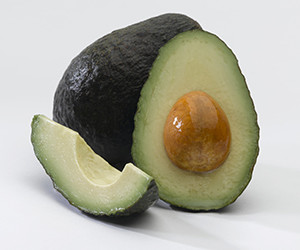
September usually brings a bounty of avocados to many families with an avocado tree in their yard.
Even if you don’t have an avocado tree, you may still find yourself the recipient of a few fruits if your neighbor’s tree yield more than they can eat. You may know that avocados are high in fat, and wonder whether they are acceptable for a bariatric surgery patient to eat. Let’s take a deeper look at avocados. Avocados are a nutrient dense fruit that contain nearly 20 vitamins and minerals. They are the only fruit known that is a good source of monounsaturated fat (that’s the good kind). According to the USDA, one serving of avocado (⅕ of a fruit) has 64 calories, 4 g carbohydrates, 3 g fiber, 0 g sugar, and 1 g protein. They are a great source of vitamins C, E, K, B-6, riboflavin, niacin, folate, pantothenic acid, magnesium, and potassium. They also provide lutein, beta carotene, and omega 3 fatty acids.
While we have been trained to shy away from high fat foods for weight loss, avocados shouldn’t be a food we avoid solely due to its fat content. Because avocados are a fruit (and not an animal product), they are naturally cholesterol free. They are a good source of healthy fats, and can keep us feeling full and satiated. In addition to healthy fats, avocados have plant sterols, which can help maintain healthy cholesterol levels.
In addition to healthy fats, avocados have lutein and zeaxanthin, two phytochemicals essential to good eye health. These two carotenoids act as antioxidants in the eye and can help protect against age related macular degeneration.
Avocados contain more folate per ounce than any other fruit. Folate has been associated with lower risk of miscarriages and neural tube defects. Adequate folate intake has shown promise in protecting against several forms of cancer. Foods high in folate may also help lower the risk of depression. The folate in foods appears to prevent an excess of homocysteine, which if allowed to build up, can interfere with dopamine, serotonin, and norepinephrine and affect mood, sleep, and appetite.
Despite its creamy texture, avocado contains fiber. Fiber is most often associated with improved digestion and prevention of constipation. High fiber intake is also associated with reduction in chronic diseases such as heart disease, stroke, hypertension, diabetes, high cholesterol, and obesity. They are also a good source of fat soluble vitamin K, which may help protect bones against osteoporosis. But, for those on blood thinners, be wary of increasing consumption of high vitamin K foods. The vitamin K may interfere with the medicine.
Avocados have many benefits, even for those who have had gastric sleeve, gastric bypass, and adjustable lap band procedures. The nutrients offered by the avocado are essential to good health. As long as the serving size of avocado keeps your overall calories at a level where you are still able to achieve your weight goal, avocados can make a great food to eat even for weight loss.
If you are looking for ideas for incorporating avocados into your diet, try these:
- guacamole
- spread on sandwiches
- wrap a slice with turkey and swiss cheese
- in a salad
- mixed in with deviled eggs
- on your morning toast
- bake an egg into it
- use in place of mayo in chicken salad
- use in your morning smoothie
This food highlight is offered by Dr. Shillingford, M.D., P.A., a board certified surgeon specializing in adjustable lap band, gastric sleeve, and gastric bypass surgeries. Dr. Shillingford’s bariatric weight loss practice is located in Boca Raton, Florida and serves patients from all over South Florida including Coral Springs, Delray Beach, Miami, Wellington, Naples, and Fort Lauderdale. Dr. Shillingford’s bariatric patients often ask about healthy foods that are nutrient dense and support a healthy heart, help with bowel regularity, support weight loss, and taste great.



